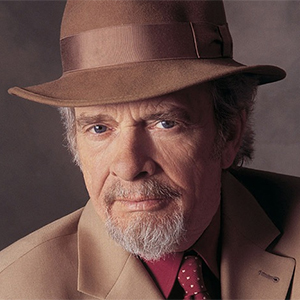Merle Haggard often gets name-checked in contemporary country songs. It's a
quick way to tip a hat to tradition and to add some honky-tonk credibility.
Haggard's 40-plus #1 hits and place in country's Mount Rushmore aside, his name
personifies the hard life that was once synonymous with the genre.
Jail time, multiple divorces, dust-ups with fellow musicians, drinking and drug
problems — Haggard's lived it all and spun his misfortunes into some of the
greatest songs of the last 50 years.
Born and raised in Bakersfield, California, Merle started playing guitar and
fiddle when he was 12. His violin teacher told Merle's mother she was wasting
her money on lessons because her son's ear was too good and he wouldn't bother
with the sheet music. Haggard said, "Right then, I think I realized I had the
ability."
But Haggard had an equal ability for mischief. He lost his dad when he was
nine, and spent the rest of a wild youth in and out of juvenile detention
centers. After a botched burglary attempt of a restaurant, he was sentenced to
15 years in San Quentin.
What might have spelled the end became a new beginning. Upon his release two
years later, Haggard dug ditches and worked as an electrician by day. At night,
he hit the West Coast bars with guitar in hand, mining his troubled past for
songs and singing like his life depended on it.
He got his first big break in 1962, singing with country star Wynn Stewart.
Stewart even gave Haggard "Sing a Sad Song," a tune he had planned to record
for himself. In 1964, it lifted Merle into the country charts for the first
time, and he never looked back. From his debut album in 1965, Haggard has
released 75 records, topped the charts with classics such as "Mama Tried,"
"Sing Me Back Home" and "If We Make It Through December," won numerous awards,
toured relentlessly and survived every musical trend thrown in his path. His
smooth, expressive voice is one of the most imitated in country, and he has
influenced singers from George Strait to Alan Jackson.
For all his success, Haggard still thinks of himself first as a songwriter. And
his songs are inseparable from his life. As Haggard said, "Lefty Frizzell once
said, 'You don't have to have lived the thing you sing about, but you got to
believe it.' And I think that's true. But it's better if you've experienced
it."
